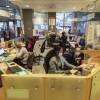I’ve spent a lot of this past week urging caution and patience as we await more data on the omicron variant.
How transmissible is it? We need more data. Will it cause more severe illness? We need more data. How well will existing vaccines work? Same refrain.
There is, however, one fact that I know with absolute certainty: We owe the African scientists who discovered and reported omicron a huge debt. Their work in the lab was outstanding. So were their reporting protocols. They gave the world an early warning of a new variant with an astounding — and troubling — number of mutations in the spike protein. They shared what they had learned with clarity, candor and commendable speed. We owe them our respect and our gratitude.
More Commentary
Yet the United States and Europe have not behaved as though we are grateful. We have not rewarded the transparency of the scientists in South Africa and Botswana who first identified omicron. Instead, we have acted in a manner that disincentivizes other nations to come forward when they, inevitably, discover other variants in the future.
On a policy level, I’m most concerned about the U.S. travel bans and U.K. “red list” restrictions imposed on a number of nations in southern Africa. By now, barely a week after it was first reported, omicron has been identified around the world, from Israel to Canada to Australia and beyond. I am writing this on Wednsday the 1st of December, but I would not be at all surprised if by the time it goes live, omicron will have been reported in the United States. The Dutch health agency RIVM just announced it found omicron when it retested patient samples collected on Nov. 19. That means it was circulating in the Netherlands at least a full week before South Africa detected omicron and promptly reported it to the World Health Organization.
Somehow, though, it’s Africa that is the target of our fear and our travel ban.
I’m not reflexively opposed to all travel bans. They can certainly be useful to slow the spread of a disease that is contained in one geographic area and is not considered highly transmissible. Even in the case of COVID-19, which is highly transmissible, a ban can buy you a bit of time before a new variant hits your shores. But that’s only useful if the variant hasn’t already spread widely (which, in this case, it has) — and if you use the days or weeks you’ve bought to prepare a coherent, evidence-based response, which might include steps such as distributing more vaccines and boosters, preparing hospitals to receive more cases and delivering strong, clear public health guidance to your population about what to expect when the variant arrives, because it will.
In this case, I don’t see much of that happening in the United States, other than increasingly urgent messaging to the public to get vaccinated and boosted. (To be clear, that’s a message I wholeheartedly support: Get vaccinated! Get boosted!) Otherwise, I see a lot of magical thinking — politicians hoping against hope that the travel ban will keep omicron out. In my view, they’re living in a fantasy world where viruses no longer do the very things that make them viruses. It’s not realistic. And it’s not helpful.
So, if the travel ban isn’t useful in helping us prepare for omicron... what is it good for?
Unfortunately, the travel ban seems to be mostly punitive. The African nations we’ve targeted are already struggling economically. South Africa was just starting to get its vital tourism industry back up and running when the ban hit. Now, it’s again in shambles.
The ban is also causing hardship to the very scientists who discovered omicron and forthrightly shared what they knew with the world. Tulio de Oliveira, the brilliant director of the Centre for Epidemic Response and Innovation (CERI) in South Africa, has tweeted that his lab is running out of critical reagents used in testing because most of those materials are imported in the cargo holds of commercial airlines — on flights that are no longer taking place. He wrote: “By losing commercial airplanes, we lose access to the importation of important reagents, medicine, vaccines, PPEs but also lose the most important exports such as gold, diamond, citrus, wine which sustain our struggling economy!”
This is infuriating. We should be supporting the scientists and governments that came forward with a model response to the discovery of a new variant. Instead, we’re punishing them. This response is likely to discourage other nations from being this transparent with their findings from genomic surveillance.
One final point: The discovery of omicron in South Africa and Botswana was not a fluke.
These nations and others in Africa have been systematically building scientific capacity and research capabilities for decades, sometimes with support from wealthy institutions in the global North. (The Botswana-Harvard Partnership, which looks to have been the very first to sequence omicron, is one outstanding example of this type of global collaboration.)
Decades of hard-won experience in understanding infectious diseases such as tuberculosis and HIV/AIDS provided the foundation for the work CERI and others have been doing on SARS-CoV-2. Labs across Africa have gained tremendous expertise in genomic surveillance in recent decades and have put that to good use throughout this pandemic. All of which is to say, the teams in Botswana and South Africa were perfectly positioned to make this breakthrough discovery. And then — in marked contrast to the slow, muddled and frankly botched communications surrounding the discovery of other variants — they rapidly shared their findings with the world.
Let’s honor their work by supporting their nations rather than strangling their economies.
It’s the right thing to do. It’s in our own self-interest, too. Because another thing I can say with absolutely certainty is that there will be more variants, and that we will need the nations who discover them to follow the African model response.








